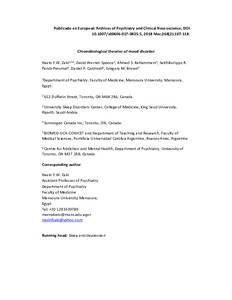Por favor, use este identificador para citar o enlazar este ítem:
https://repositorio.uca.edu.ar/handle/123456789/9552| Título: | Chronobiological theories of mood disorder | Autor: | Zaki, Nevin F. W. Spence, David Warren BaHammam, Ahmed S. Pandi Perumal, Seithikurippu R. Cardinali, Daniel Pedro Brown, Gregory M. |
Palabras clave: | LUZ; CRONOBIOLOGIA; RITMO CIRCADIANO; DEPRESION; MELATONINA; TRASTORNOS DEL ESTADO DE ANIMO | Fecha de publicación: | 2018 | Editorial: | Springer | Cita: | Zaki, N.F. et al. Chronobiological theories of mood disorder [en línea]. European Archives of Psychiatry and Clinical Neuroscience. 2018, 268(2). doi:10.1007/s00406-017-0835-5 Disponible en: https://repositorio.uca.edu.ar/handle/123456789/9552 | Resumen: | Abstract: Major depressive disorder (MDD) remains the most prevalent mental disorder and a leading cause of disability, affecting approximately 100 million adults worldwide. The disorder is characterized by a constellation of symptoms affecting mood, anxiety, neurochemical balance, sleep patterns, and circadian and/or seasonal rhythm entrainment. However, the mechanisms underlying the association between chronobiological parameters and depression remain unknown. A PubMed search was conducted to review articles from 1979 to the present, using the following search terms: "chronobiology," "mood," "sleep," and "circadian rhythms." We aimed to synthesize the literature investigating chronobiological theories of mood disorders. Current treatments primarily include tricyclic antidepressants and selective serotonin reuptake inhibitors, which are known to increase extracellular concentrations of monoamine neurotransmitters. However, these antidepressants do not treat the sleep disturbances or circadian and/or seasonal rhythm dysfunctions associated with depressive disorders. Several theories associating sleep and circadian rhythm disturbances with depression have been proposed. Current evidence supports the existence of associations between these, but the direction of causality remains elusive. Given the existence of chronobiological disturbances in depression and evidence regarding their treatment in improving depression, a chronobiological approach, including timely use of light and melatonin agonists, could complement the treatment of MDD. | URI: | https://repositorio.uca.edu.ar/handle/123456789/9552 | ISSN: | 0940-1334 (impreso) 1433-8491 (online) |
Disciplina: | MEDICINA | DOI: | 10.1007/s00406-017-0835-5 | Derechos: | Acceso abierto | Fuente: | European Archives of Psychiatry and Clinical Neuroscience. 2018, 268(2) |
| Aparece en las colecciones: | Artículos |
Ficheros en este ítem:
| Fichero | Descripción | Tamaño | Formato | |
|---|---|---|---|---|
| chronobiological-theories-mood-disorder.pdf | 242,07 kB | Adobe PDF |  Visualizar/Abrir |
Visualizaciones de página(s)
434
comprobado en 16-feb-2026
Descarga(s)
2.093
comprobado en 16-feb-2026
Google ScholarTM
Ver en Google Scholar
Altmetric
Altmetric
Este ítem está sujeto a una Licencia Creative Commons

